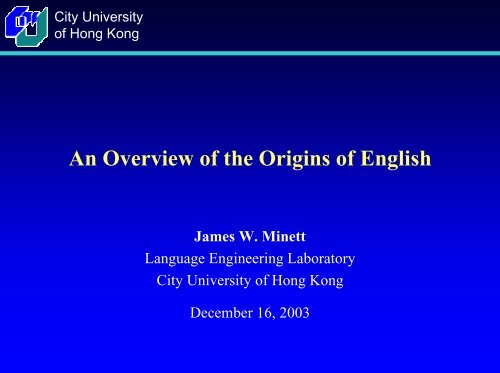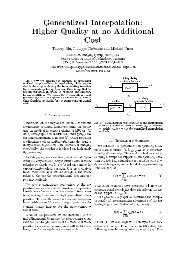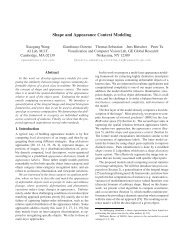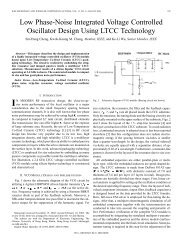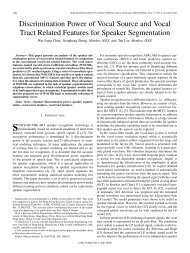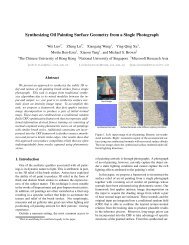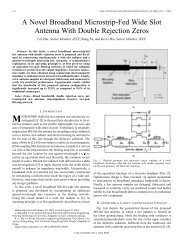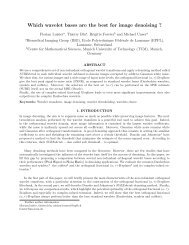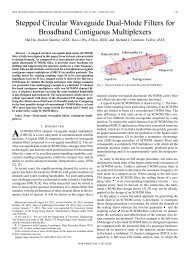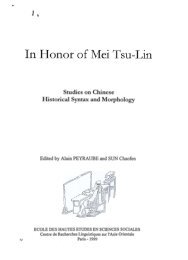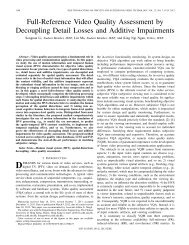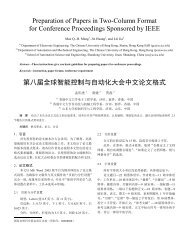An Overview of the Origins of English
An Overview of the Origins of English
An Overview of the Origins of English
Create successful ePaper yourself
Turn your PDF publications into a flip-book with our unique Google optimized e-Paper software.
City University<br />
<strong>of</strong> Hong Kong<br />
<strong>An</strong> <strong>Overview</strong> <strong>of</strong> <strong>the</strong> <strong>Origins</strong> <strong>of</strong> <strong>English</strong><br />
James W. Minett<br />
Language Engineering Laboratory<br />
City University <strong>of</strong> Hong Kong<br />
December 16, 2003
Conquest & Language – pre-<strong>English</strong><br />
• 55 B.C.E. – Romans arrive<br />
• 410 – Romans depart<br />
• Few borrowings (c. 20) from <strong>the</strong> indigenous Celtic, e.g.:<br />
– carr ‘rock’, dunn ‘grey’, brock ‘badger’<br />
• A few Celtic-based place names, e.g.:<br />
– Rivers: Thames, Avon ‘river’, Wye<br />
– Towns: Dover ‘water’, London (tribal name), Kent<br />
• A number <strong>of</strong> cultural borrowings (c. 200) from Latin, e.g.:<br />
– Food: pise ‘pea’, win ‘wine’, cyse ‘cheese’, plante ‘plant’<br />
– Clothing: belt ‘belt’, cemes ‘shirt’, sutere ‘shoemaker’<br />
– O<strong>the</strong>rs: weall ‘wall’, stræt ‘road’, pund ‘pound’, munuc ‘monk’
Conquest & Language – “Ingvaeonic”<br />
• c. 449 – Jutes settle in Kent<br />
• 449 – <strong>An</strong>gles settle in Northumbria & Mercia<br />
• 477 – Saxons settle in Sussex, Essex, Middlesex and Wessex<br />
– Each tribe spoke a dialect <strong>of</strong> Ingvaeonic, a sub-group <strong>of</strong> West-Germanic
Conquest & Language – Old <strong>English</strong><br />
• Four distinct dialects formed:<br />
– Kentish (Jutes); few extant texts<br />
– Northumbrian (<strong>An</strong>gles), dominant in late 7 th century<br />
– Mercian (<strong>An</strong>gles), dominant in early 8 th century<br />
– (West) Saxon, dominant in 9 th & 10 th centuries; most extant texts are Saxon<br />
– Northumbrian: Nu scylun hergan hefaenricaes uard,<br />
(8 th C) Metudæs maecti end his modgidanc,<br />
Uerc uuldurfadur, sue he uundra gihuaes,<br />
Eci dryctin, or astelidæ.<br />
– West Saxon: Nu we sceolan herigean he<strong>of</strong>onrices weard,<br />
(11 th C) Metodes mihte 7 his modgeþanc,<br />
Wera wuldorfæder, swa he wuldres gehwæs,<br />
Ece drihten, ord onstealde.<br />
– Translation: Now we shall praise <strong>the</strong> keeper <strong>of</strong> <strong>the</strong> heavenly kingdom,<br />
<strong>the</strong> power <strong>of</strong> <strong>the</strong> lord <strong>of</strong> destiny and his imagination,<br />
<strong>the</strong> deeds <strong>of</strong> <strong>the</strong> glorious fa<strong>the</strong>r, when <strong>of</strong> every glorious thing<br />
he, <strong>the</strong> eternal lord, ordained <strong>the</strong> beginning
Features <strong>of</strong> <strong>the</strong> Old <strong>English</strong> Lexicon<br />
• Widespread use <strong>of</strong> compounding:<br />
– dæg ‘day’ + red ‘red’ = dægred ‘dawn’<br />
– beor ‘beer’ + scipe ‘ship’ = gebeorscipe ‘banquet’<br />
– ban ‘bone’ + hus ‘house’ = banhus ‘body’<br />
– fisces ‘fish’ + eþel ‘home’ = fisceseþel ‘sea’<br />
– seol ‘seal’ + bæþ ‘bath’ = seolbæþ ‘sea’<br />
• … and affixation:<br />
– gan ‘go’<br />
– ingan ‘go in’<br />
– oþgan ‘go away’<br />
– upgan ‘go up’<br />
– utgan ‘go out’
Personal Pronouns – Old <strong>English</strong><br />
Nominative Accusative Dative Genitive<br />
1 st singular<br />
2 nd singular<br />
3 rd singular (M)<br />
ic me me min<br />
þu þe þe þin<br />
he hine him his<br />
3 rd singular (F)<br />
heo hi hire hire<br />
3 rd singular (N)<br />
hit hit him his<br />
1 st plural<br />
2 nd plural<br />
3 rd plural<br />
we us us ure<br />
ge oew eow eower<br />
hi heo him hira
<strong>An</strong> Old <strong>English</strong> Text – what is it?<br />
Fæder ure, þu þe eart on he<strong>of</strong>onum,<br />
si þin nama gehalgod.<br />
To becume þin rice.<br />
Gewurþe ðin willa on eorðan swa swa on he<strong>of</strong>onum.<br />
Urne gedæghwamlican hlaf syle us to dæg.<br />
<strong>An</strong>d forgyf us ure gyltas,<br />
swa swa we forgyfað urum gyltendum.<br />
<strong>An</strong>d ne gelæd þu us costnunge,<br />
ac alys us <strong>of</strong> yfele.
Translation into Modern (?) <strong>English</strong><br />
Our Fa<strong>the</strong>r, who art in Heaven,<br />
hallowed be thy name.<br />
Thy kingdom come.<br />
Thy will be done on Earth as it is in Heaven.<br />
Give us this day our daily bread.<br />
<strong>An</strong>d forgive us our trespasses,<br />
as we forgive those who trespass against us.<br />
<strong>An</strong>d lead us not into temptation,<br />
but deliver us from evil.
Recognizable (?) Cognates with Modern <strong>English</strong><br />
Fæder ‘fa<strong>the</strong>r’ ure ‘our’<br />
on ‘in’ he<strong>of</strong>onum ‘heaven’<br />
nama ‘name’ becume ‘come’<br />
þin / ðin ‘thy (your)’ willa ‘will’<br />
eorðan ‘earth’ us ‘us’<br />
dæg ‘day’ forgyf ‘forgive’<br />
gyltas ‘guilt, trespass’ yfele ‘evil’<br />
eart ‘is’ (2 nd sg.)
Conquest & Language – Latin<br />
• 597 – Augustine sent to Kent from Rome to introduce Christianity<br />
to <strong>the</strong> <strong>English</strong><br />
• Numerous borrowings, many relating to religion, e.g.:<br />
– Religious: alter ‘altar’, apostol ‘apostle’, cylpe ‘fault’, mæsse ‘mass’<br />
– O<strong>the</strong>rs: calend ‘month’, epistol ‘letter’, fenester ‘window’<br />
• Semantic shifting <strong>of</strong> extant Old <strong>English</strong> words in religious contexts, e.g.:<br />
– ‘heaven’, ‘hell’, ‘God’, ‘sin’
Traces <strong>of</strong> <strong>the</strong> First Vowel Shift<br />
• i-umlaut – c. 7 th century:<br />
– Condition: vowel in stressed syllable + high-front vowel [i]<br />
Mutation: vowels in stressed syllable fronted and raised<br />
• Example: ‘foot’ */fo:t/ (sing.), /fo:tiz/ (plur.)<br />
i) in <strong>the</strong> plural, [o:] → [e:] (which later shifted to [i:])<br />
ii) -iz ending dropped as sing and plural distinct, to give /fo:t/, /fe:t/<br />
• Verb-forming suffix: *-ian e.g. food/feed<br />
Adjective-forming suffix: *-iþ e.g. strong/strength<br />
• <strong>An</strong> example <strong>of</strong> vowel harmony
Conquest & Language – Old Norse<br />
• 787 – Frequent raids by Vikings, leading to:<br />
• 886 – Introduction <strong>of</strong> Danelaw; contact with Old Norse<br />
• 991 – Danish rule <strong>of</strong> England for 25 years<br />
Winchester<br />
London
Conquest & Language – Old Norse<br />
• Numerous borrowings, e.g.:<br />
– Common words: both, same, get, give, take, <strong>the</strong>y<br />
– General: want, knife, die, fellow<br />
– Towns: Derby, Rugby, Althorp, Braithwait, Lowest<strong>of</strong>t<br />
– Introduction <strong>of</strong> consonant cluster: sk-, e.g. skirt, sky, skin, skill<br />
• Competition between Old <strong>English</strong> (OE) and Old Norse (ON) forms:<br />
– OE retained: path / reike (ON); sorrow / site (ON);<br />
– OE replaced: egg / ey (OE); sister / sweostor (OE);<br />
– Co-existing: ill (OE) / sick (ON); hide (OE) / skin (ON);<br />
heal (OE) / hail (ON); church (OE) / kirk (ON)<br />
• Many Old Norse borrowings did not find literary use until<br />
12 th century or later, and <strong>the</strong>n mainly in Nor<strong>the</strong>rn texts
Conquest & Language – Old Norse<br />
• Many inflections lost:<br />
– Possible emergence <strong>of</strong> pidgin facilitating communication between<br />
Old Norse speakers <strong>of</strong> <strong>the</strong> Danelaw and Old <strong>English</strong> speakers<br />
<strong>of</strong> Northumberland and Mercia<br />
– Morphology replaced by word order<br />
– Transition from SOV to SVO established<br />
• 3 rd person plural pronouns replaced:<br />
hi, heo, him , hira → <strong>the</strong>y, <strong>the</strong>m, (to) <strong>the</strong>m, <strong>the</strong>ir<br />
• 1 st , 2 nd & 3 rd person plural <strong>of</strong> copula:<br />
sindon → are<br />
• 3 rd person singular present tense verb ending: -s
Gradual Emergence <strong>of</strong> Middle <strong>English</strong><br />
• 1066 – Norman rule <strong>of</strong> England begins<br />
• 1264-5 – Rise <strong>of</strong> <strong>English</strong> nationalism: Barons’ War<br />
• 1337-1453 – Hundred Years War with France<br />
• 1362 – <strong>English</strong> language used for first time in Parliament<br />
• Why was <strong>English</strong> not replaced by French?<br />
– c. 2% Norman population<br />
– Deteriorating relations with France after 150 years<br />
– The monarch and court spoke French, but by late 12 th century,<br />
inter-marriage common; children <strong>of</strong> nobles were native <strong>English</strong> speakers<br />
• <strong>An</strong>glo-Saxon literary styles disappeared in 11 th century, but were<br />
briefly adopted again in 13 th century, perhaps due to nationalism
The Middle <strong>English</strong> Lexicon<br />
• In Old <strong>English</strong>,
The Middle <strong>English</strong> Dialects<br />
• The dialects <strong>of</strong> Middle <strong>English</strong><br />
correlate well to those <strong>of</strong> Old <strong>English</strong>:<br />
– Kentish<br />
– Northumbrian, now called Nor<strong>the</strong>rn<br />
– Mercian, split into West and East Midland<br />
– West Saxon, now called Sou<strong>the</strong>rn<br />
• The standardization <strong>of</strong> literary <strong>English</strong>:<br />
– The influence <strong>of</strong> London grew from <strong>the</strong> mid-14 th century<br />
– Migration brought <strong>the</strong> London dialect into contact with o<strong>the</strong>r dialects<br />
and writing styles, particularly from <strong>the</strong> East Midlands;<br />
– Printing, brought to London by William Caxton in 1476, allowed <strong>the</strong><br />
East Midland-influenced literary style to become a national standard<br />
from which emerged Modern <strong>English</strong>
The Great Vowel Shift<br />
• One shift or two independent shifts? – raising + diphthongization
The Advent <strong>of</strong> Modern <strong>English</strong> – Chaucer to Shakespeare<br />
• Chaucer, The Canterbury Tales (c.1400):<br />
O mooder Mayde! O mayde Mooder free!<br />
O bussh unbrent brennynge in Motses sighte<br />
That ravyshedst doun fro <strong>the</strong> Deitee<br />
Thurgh thyn humblesse <strong>the</strong> Goost that in th’alighte …<br />
• Shakespeare, Macbeth (1605–6):<br />
Now o’er <strong>the</strong> one half-world<br />
Nature seems dead, and wicked dreams abuse<br />
The curtain’d sleep; now witchcraft celebrates<br />
Pale Hecate’s <strong>of</strong>ferings; and wi<strong>the</strong>r’d murder …


